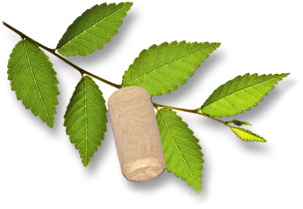Synthetic corks are becoming increasingly popular as a means for sealing up wine bottles. Numbers are sketchy, but it appears that currently around 9 percent of all corked wine bottles in the world are done so with synthetic corks.
are becoming increasingly popular as a means for sealing up wine bottles. Numbers are sketchy, but it appears that currently around 9 percent of all corked wine bottles in the world are done so with synthetic corks.
There’s lots of reasons for this slow increase in popularity, but the main one is pure economics. Over the last decade, wine consumption has increased roughly an average of 4.5% per year. Natural cork producers are finding it difficult to keep up with this increase.
It takes an incredible 25 years for a cork tree to mature into a cork producer. So simply planting more trees does not immediately satisfy the demand that wineries place on the cork producers. The end result is: as the demand for cork increases, so does it’s price. Enter synthetic corks…
Necessity is the mother of invention and the synthetic cork is just one more example of how this timeless quote is so true.
Synthetic corks have been the markets way of solving this supply-and-demand disconnect. And they’ve turned out to be a pretty good wine preservation system. They are affordable, and will consistently and predictably seal up a wine bottle. Many wineries now prefer them over natural cork for this reason alone.
Synthetic corks are basically a spongy plastic that is wrapped in a harder plastic shell. They react to corking devices and to the barrel of the wine bottle in much the same way as a natural cork, so no special equipment is needed. All the plastics involved are pharmaceutical grade and completely safe to use around food products.
We offer synthetic corks as well because of their ease of use and also because of their popularity. Many home winemakers like them simply for the fact that they can be sanitize more completely than natural corks.
———————————————————————————————————
Ed Kraus is a 3rd generation home brewer/winemaker and has been an owner of E. C. Kraus since 1999. He has been helping individuals make better wine and beer for over 25 years.
